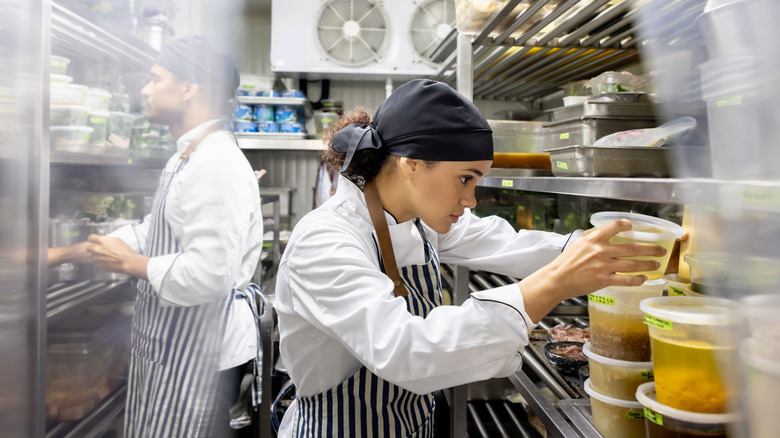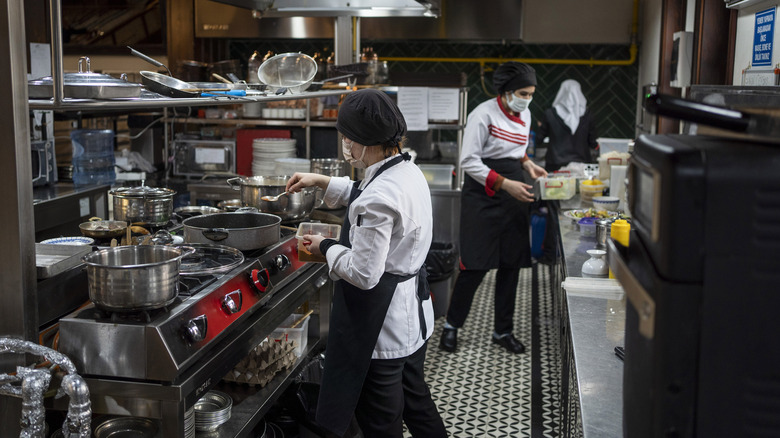CDC Report Ties 40% Of Food Poisoning Outbreaks To Sick Workers
If you've ever shown up to a food service job sick, the CDC has just published some data for you to print out, laminate, and staple to your boss' desk. The CDC estimates that roughly 48 million U.S. consumers contract a foodborne illness every single year. Last fall, a cheese-linked Listeria outbreak sent multiple people to the hospital. One week ago, another salmonella outbreak sickened over 50 people who dined at a Boston restaurant. The regularity of mass outbreaks like these has become nothing short of an epidemic — but how could they have been allowed to happen in the first place? Turns out, according to this latest CDC data, that the answer all comes down to one primary culprit: The lack of low-paid workers' rights in the U.S.
Per the CDC report, 40% of all foodborne illnesses from 2017-2019 were directly linked to unwell workers. The data comes from a study of 800 separate outbreaks reported by 25 state and local health departments across 875 establishments. 725 managers were interviewed, and while a vast majority said that their establishments had some sort of policy requiring workers to inform their employers if they were sick, only 85.5% said that these policies actually prevented workers from coming in for their shifts — and just over half of these said these policies were even written down. The most disquieting finding? Just 316 managers said their establishments provided paid sick leave, which is less than half.
Low-wage food service employees may be unable to call off of work
Not coming into work sick is basically food safety 101 — but, for millions of food service employees who are subjected to at-will employment, the luxury of paid sick days is not afforded and staying out of work to convalesce can be a threat to job security. According to the employment platform Indeed, under at-will employment means that, "As an employer, not only are you permitted to terminate without cause, but you're also generally able to change an employee's job duties, lower their salary, change their benefits or adjust their paid time off at-will." Sound unfair? In the U.S., at-will is the most common type of contract between workers and employers.
The CDC's report concluded with the prescription that "Contamination of food by ill or infectious food workers is an important cause of outbreaks; therefore, the content and enforcement of existing policies might need to be re-examined and refined." But, workers would likely argue that lax policy enforcement isn't the problem here — it's the ramifications of observing those policies.
Via the U.S. Census Bureau, 11.6% of Americans were living below the poverty line as of 2021. Sick days are both a human rights issue and, when it comes to the food service industry, a public safety issue. What sick days are not (or, what they shouldn't be) is a luxury. This issue has taken on an entirely new gravity in the wake of the COVID-19 pandemic.
Industry-wide policy reform might be on the table
America is the only developed country in the world without universal paid sick days. As Senator Bernie Sanders recently told MSNBC, "If you are a supporter of the working class, how are you going to vote against the proposal which provides guaranteed paid sick leave to workers who have none right now?" The statement was made regarding rail workers, who organized one of the largest nationwide strikes in U.S. history to demand paid sick leave, but the sentiment is all-too applicable for food service employees as well.
Industry-wide policy reform is essential — or, rather, it has always been essential, but now it's undeniable, even to policy-makers, who have thus far been profiting from the labor of workers who've been forced to work while ill. McDonald's President Chris Kempczinski has an estimated net worth of at least $24.1 million. Former Chipotle CEO Steve Ells has a 2023 net worth of $220 million. Former Starbucks CEO Howard Schultz has a current net worth of $3.7 billion. The average Taco Bell employee makes less than $14 an hour.
Daniel Schneider, a professor of social policy at the Harvard Kennedy School, tells The New York Times that the best prescription to remedy this epidemic is to create "a food safety culture where absenteeism due to illness is not penalized." Federal paid sick leave could (at long last) be on the horizon.


